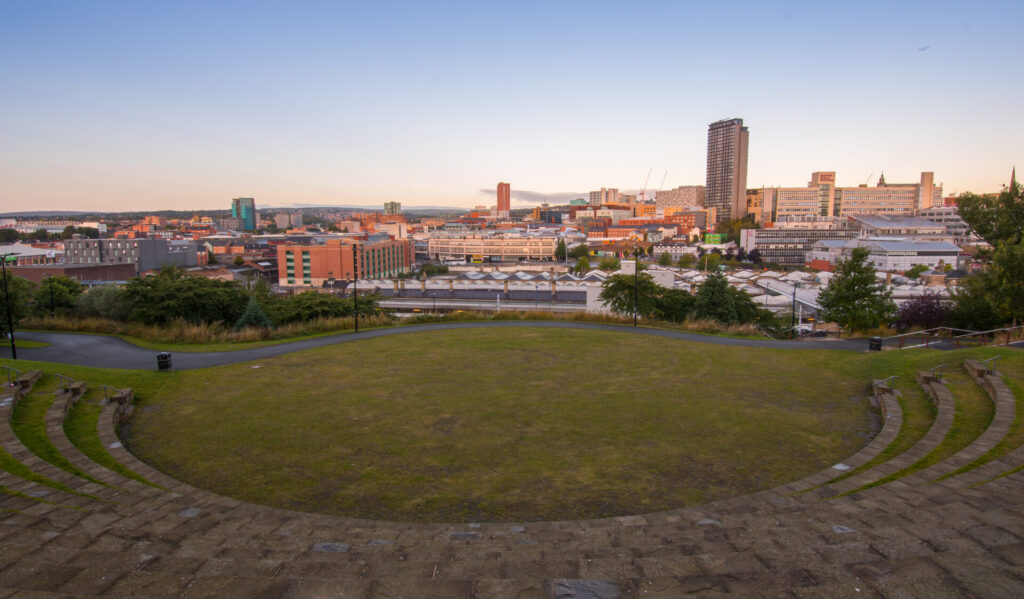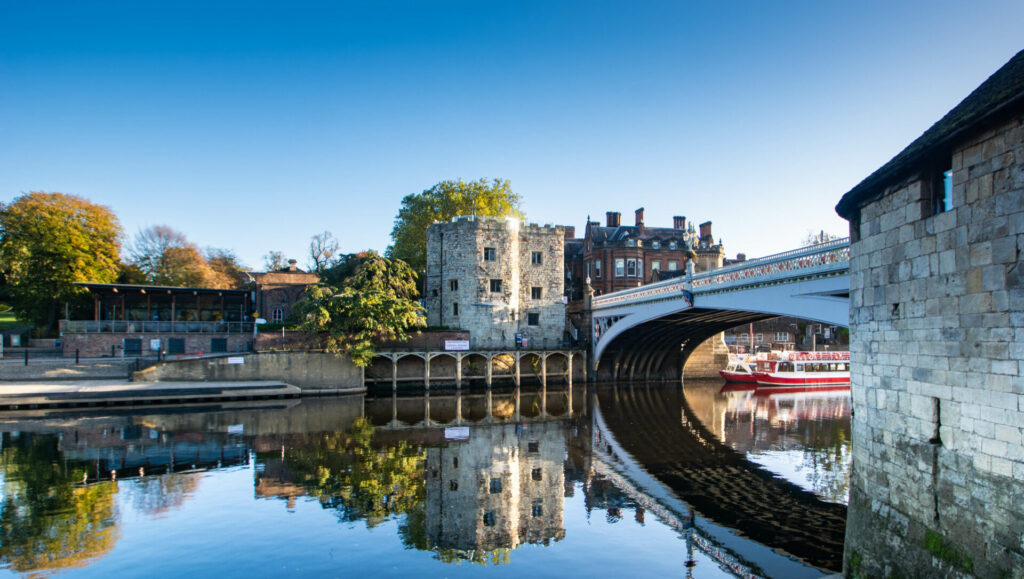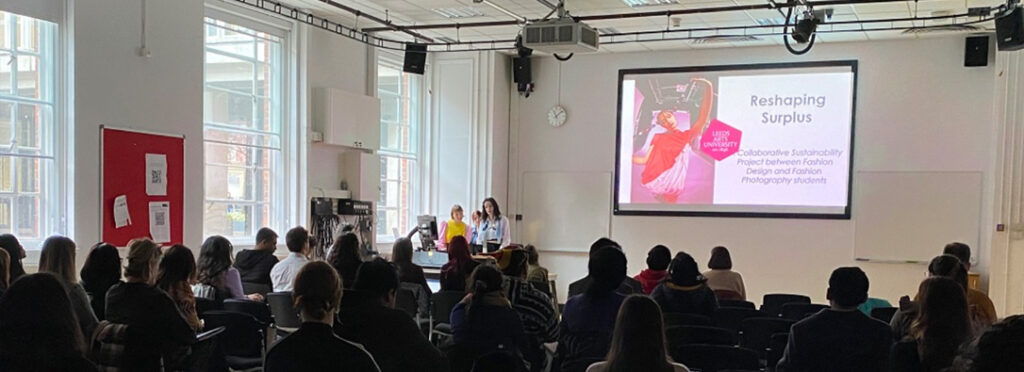
Addressing issues around climate and sustainability is a key part of universities civic responsibilities. As influential anchor institutions, universities:
- provide opportunities for students and staff to engage with climate issues both academically and practically;
- have an excellent understanding of their region and can provide both place-based and global perspectives to addressing complex issues;
- are able to influence the surrounding ecosystem of organisations;
In addition to our twelve member universities, Yorkshire Universities has strong links with a range of other anchor institutions across Yorkshire, such as local government organisations and the NHS. Much of our work revolves around our ability to connect and convene diverse stakeholders; as such we are able to support a response to issues of climate and sustainability that is truly representative of Yorkshire.
Yorkshire & Humber Climate Commission
UPP Sustainability Service-Learning Pilot Project
Yorkshire & Humber Climate Commission

The Yorkshire and Humber Climate Commission (YHCC) is an independent advisory body set up to bring actors from the public, private and third sectors together to support and guide ambitious climate actions across the region. Dr Peter O’Brien, YU Executive Director, is a member of the Commission.
The Commission has four inter-related aims:
- to foster climate resilience and adaptation to climate risks and impacts;
- to support rapid progress towards net zero carbon emissions;
- to encourage a just and inclusive transition and climate actions that leave no-one and nowhere behind; and
- to promote sustainability and climate actions that also protect nature and biodiversity.
Find out more about the Commission.
The YHCC convenes a series of panels which focus on specific challenges or topics.
Ensuring that the Commission connects to the region’s research base to strengthen the evidence base underpinning its work and to allow it to foster and benefit from future research.
Research & Evidence Panel

Yorkshire Universities has been tasked with convening the Research & Evidence Panel (REP) of the YHCC. Since the beginning of the YHCC, the Research and Evidence Panel (REP) coordinated by Yorkshire Universities (YU), has been working closely with the secretariat of the YHCC to ensure that the Commission connects to the region’s research base to strengthen the evidence base underpinning its work and to allow it to foster and benefit from future research.
Current activity: Delivering Impact Sessions
Key to the delivery of the YHCC actions is informative, authoritative and robust research and evidence. Yorkshire and the Humber’s universities hold a diverse, internationally-recognised, research base that will be vital in delivering the climate action plan.
The implementation of the Plan will rely on the diverse, internationally recognised
research, innovation and knowledge base and exchange capacity within the universities across our region. To do this, the Commission is establishing a programme of ‘Delivering Impact’ sessions (or DI sessions) that will run through to early 2024 with a focus on net zero, climate resilience, nature recovery and fair and inclusive (or just) transitions in the region.
The draft outputs from the DI sessions form the basis for extensive citizen engagement. To facilitate this, a digital platform called Commonplace was launched to gather feedback from everyone who would like to contribute. The information collected will feed into Climate Action Progress Review that the Commission is preparing for launch in March 2024.
Would you like to be involved with the REP or a Delivering Impact Session? We’d be pleased to have you on board! Get in touch with us.
Related publications
- Terms & reference of the Research and Evidence Panel
- The climate emergency requires local and regional action in Yorkshire
- Yorkshire and Humber Climate Commission press release: Ambitious climate partnership for Yorkshire and Humber
- Yorkshire Universities & Arup regional roundtable on the climate emergency: a summary
Research & Evidence Panel members
- Chair: Dr Robyn Cooper Inglis, Research Development Manager, Environment, at the York Environmental Sustainability Institute (YESI), University of York
- Professor Ashraf Ashour, Professor of Structural Engineering, University of Bradford
- Dr Jo Cutter, Lecturer in Work and Employment Relations, University of Leeds
- Dr William Eadson, Reader in Urban and Regional Sustainability Policy at CRESR, Sheffield Hallam University
- Patrick Flavin, Carbon and Energy Reduction Officer, University of Huddersfield
- Dr David Glew, Director of the Leeds Sustainability Institute, Leeds Beckett University, Head of Energy Efficiency and Policy
- Professor Andy Gouldson, Environment and Climate Policy, University of Leeds, Co-lead of the ESRC Place-based Climate Action Network and Chair of Leeds Climate Commission
- Professor Rachel Rothman, Professor of Sustainable Chemical Engineering, University of Sheffield
- Professor Vera Trappman, Director of Sustainability Leeds University Business School
- Dr Steven Forrest, Lecturer in Flood Resilience and Sustainable Transformations, University of Hull
UPP Sustainability Service-Learning Pilot Project

In January 2023, Yorkshire Universities was named as one of the eight initiatives awarded funding by the UPP Foundation. Our application supported universities’ efforts to embed environmental sustainability within their local community and enable students to directly contribute to achieving this.
Our project is a Sustainability Service-Learning Pilot, where students use the knowledge and skills they have acquired within their degree to help deliver positive social change locally. Specifically, we will be auditing existing work by our members, scoping a brokerage network between communities and universities, and fund challenges.
Our project Task & Finish Group will be chaired by Professor Dave Petley, Vice-Chancellor at the University of Hull, with representatives from all twelve YU member institutions contributing to the delivery of the project.
Challenges
This project will allocate £1,000 pilot challenge funding to each YU member to use towards enabling or boosting sustainability service-learning activity at their respective institutions before the end of March 2024.
£3,000 of the total grant funding from the UPP Foundation will be allocated to pilot a multi-university challenge fund. The challenge will be set jointly with the Yorkshire & Humber Climate Commission (YHCC), and students from three or more YU member institutions will be invited to form a group to help solve this challenge.
Those completing the pilot challenges will be issued a ‘Certificate of Achievement and Contribution to the Delivery of the Regional Climate Action Plan’. The Certificate will detail the green skills used and developed during the project, and it will help students to demonstrate their employability skills to prospective employers. The Certificate will be endorsed by YU and the YHCC. Participants will be invited to present at the next Student Sustainability Research Conference in February 2024. Read more about this YU project here.
The regional service-learning landscape audit
In the first phase of this project, we want to better understand ways in which HE students in Yorkshire and the Humber can engage with sustainability service learning. To achieve this, we’re currently conducting a survey and project collaborators are asked to answer four questions related to:
- Their definition of service learning.
- Detailing existing sustainability service-learning related activities.
- Explaining what works well.
- Detailing to what extent sustainability is embedded in their curriculum.
The information we gather from this stage will be adapted into case studies that you’ll be able to read about here. By the time the project is due to finish in March 2024 we aim to transform this information and our learning into a toolkit other HEIs will be able to use beyond our region.
Project Oversight Group members
- Chair: Professor Dave Petley, Vice-Chancellor, University of Hull
- Claire Aydogan, Head of Careers and Employability, and Dave Stanbury, Deputy Head of Careers and Employability, University of Huddersfield
- Laura Bielby, Student Opportunity and Experiential Learning Manager, and Nicola Porter, Experiential Learning Team Leader, Leeds Beckett University
- Katie Clegg, Director of Sustainability, Leeds Trinity University
- Andrew Ferguson, Head of Student Opportunity, University of York
- Dr Steven Forrest, Lecturer in Flood Resilience and Sustainable Transformations, and Dr Lesley Morrell Associate Dean (Education) in the Faculty of Science and Engineering, and Director of Curriculum Transformation, University of Hull
- Dr Catherine Heinemeyer, Senior Research Associate in the Institute for Social Justice, York St John
- Clare Jackson, Sustainability Programme Officer, University of Leeds
- Andrew Jones, Head of Careers, Employability and Enterprise, and Claire Booth, Sustainability Manager, Leeds Arts University
- Professor Anand Prathivadi, Public Policy & Sustainability, and Helen Cutts, Associate Director of Sustainability, University of Bradford
- Helen Smith, Head of Careers, and Alison H Riley, Academic Development Adviser in Academic Programmes and Student Engagement (APSE), University of Sheffield
- James Warrender, Employability and Enterprise Manager, Leeds Conservatoire
- Professor Peter Wells, Public Policy Analysis and Evaluation in CRESR, Sheffield Hallam University
Student Sustainability Research Conference 2023 & 24

The Student Sustainability Research Conference is an annual event organised and hosted by the University of Leeds. In 2023, Yorkshire Universities (YU) was a supporting event partner and the conference was opened to student speakers from universities across the YU membership. There is an ambition to keep this opportunity open to students from across the region in future years.
The SSRC allows students to present their research and to attend various talks and workshops, enriching their studies and cementing the importance of issues around climate and sustainability.
In 2023, the event was attended by over 300 students from eleven of our member universities, with dozens of academic posters, talks, workshops exhibitions and installations.
In 2024, we expect to hear from students involved in the above UPP challenges to present their experience and findings.
WHAT’S NEW?
- Collaborative Regional Conference Showcases Student Sustainability Research
- Our Multi-University Challenge Day: Fostering Sustainability through Collaboration
- Higher Education Policy Landscape – Summer 2023













